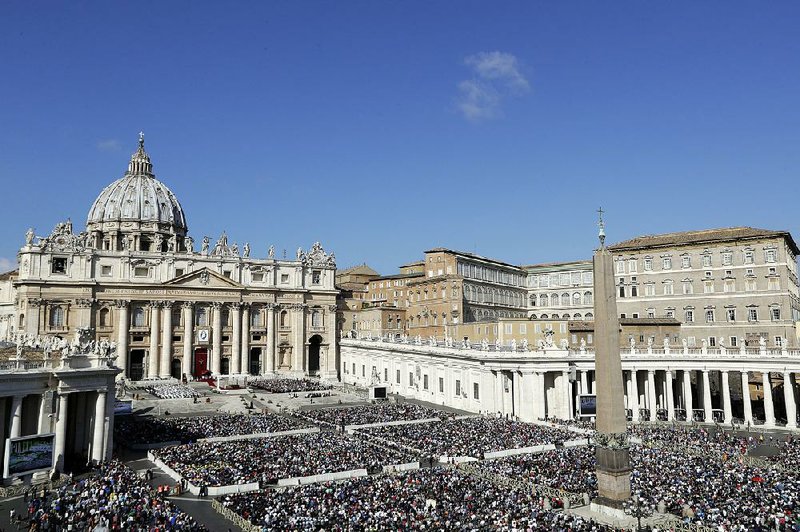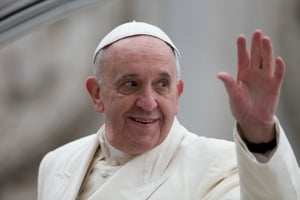VATICAN CITY -- Pope Francis named 17 new cardinals Sunday, including three American moderates.
Indianapolis Archbishop Joseph Tobin was a surprise selection. Tobin has openly opposed efforts by Indiana Gov. Mike Pence to bar Syrian refugees and migrants from being resettled in the state. A ruling from a U.S. federal appeals court will prevent Pence, the Republican vice presidential candidate, from doing that for now.
"I am shocked beyond words by the decision of the Holy Father," Tobin tweeted. "Please pray for me."
Francis has made the plight of refugees and migrants one of the hallmarks of his papacy, even bringing a dozen Syrians home with him from Lesbos, Greece. He has asserted that anyone who wants to build a wall along the U.S.-Mexico border to keep out migrants is "not Christian."
"You can find a political message" in the Tobin appointment, said Massimo Faggioli, a Villanova University expert on the Vatican.
The two other Americans chosen as cardinals are the leading U.S. moderate, Chicago Archbishop Blase Cupich, and outgoing Dallas Bishop Kevin Farrell, whom Francis tapped in August to head the Vatican's new family and laity office.
U.S. Ambassador Kenneth Hackett, referring to the dearth of U.S. cardinal appointees in recent years, on Sunday tweeted, "Wow. I guess we are back!"
Thirteen of the 17 new cardinals, including all the Americans, are under age 80 and thus eligible to vote in a future conclave to elect Francis' successor -- the key job of a cardinal.
Francis will elevate all 17 at a ceremony Nov. 19, on the eve of the closure of his Holy Year of Mercy.
As is Francis' tradition, the new cardinals hail from some of the most far-flung and peripheral corners of the globe: Bangui, Central African Republic; Port Louis, Mauritius; and Tlalnepantla, Mexico.
Only one Italian elector was named: Francis' ambassador to "the beloved and martyred Syria," Cardinal-elect Mario Zenari.
And one of the over-80 cardinals is a clear sentimental favorite: the Rev. Ernest Troshani Simoni of Albania. Simoni, who turns 88 later this month, brought Francis to tears when he recounted his life story to the pope during Francis' 2014 visit to Tirana, including two decades he spent imprisoned, tortured and sentenced to forced labor for refusing to speak out against the Catholic Church during Albania's communist rule.
After embracing Simoni that day, Francis said: "Today I touched martyrs."
In all, seven countries that have never had a cardinal are getting one in this, the third group named by South America's first pope. Europe still has the most voting-age cardinals with 54.
"The geographical diversity is in keeping with the trajectory of recent popes to expand the global representation in the College of Cardinals to reflect the fact that the Church is universal, not simply European," said Mark Brumley, president of Ignatius Press, the leading English-language publisher of both Emeritus Pope Benedict XVI and Francis.
Brumley, the papal publisher, said Tobin's nomination was the clear "outside the box" surprise given that Indianapolis hasn't been a traditional archdiocese that takes a cardinal.
"But he is a great bishop who combines a commitment to Catholic teaching with pastoral passion," Brumley said.
Speaking Sunday at the end of a special Mass on the steps of St. Peter's Basilica, Francis said the mix of 11 nations from which he named cardinals "announces and is witness to the good news of the mercy of God in every corner of the world."
On Nov. 28, Cardinal Theodore-Adrien Sarr of Senegal will turn 80, bringing the number of voting-age prelates down to 120, the maximum allowed under current rules. Francis has appointed 44 of them, or just over a third.
Of the new cardinals, Cupich is very much a pastor in Francis' likeness, emphasizing the merciful and welcoming side of the church. His nomination as Chicago archbishop was Francis' first major U.S. appointment, and he was a Francis appointee at the pope's family synod last year.
In a statement, Cupich said his appointment was "humbling and encouraging" and said he hoped that despite the new responsibilities, he and his flock would "continue the task we have begun of renewing the church in the archdiocese and preparing it to thrive in the decades ahead."
Tobin had been the No. 2 in the Vatican office for religious orders for only two years when in 2012, Pope Benedict XVI sent him back to the U.S. to head the Indianapolis archdiocese, which has fewer than 230,000 parishioners.
The transfer was seen in some Vatican circles as being tied to Tobin's efforts to promote dialogue and resolve tensions between the Vatican and U.S. nuns who were subject of two separate Holy See investigations at the time.
After Francis was elected, both investigations were concluded with Vatican praise for the work of the sisters.
Francis has made it a point to no longer automatically name cardinals from big dioceses, as had been the practice for centuries. The Italian cities of Venice and Turin, for example, have been without cardinals for several years.
Francis did make an exception to his own rule Sunday by returning a red hat to Brussels after it went without a cardinal during the tenure of Archbishop Andre Joseph Leonard, a staunch traditionalist. Francis accepted Leonard's retirement in 2015 and appointed a more progressive replacement in Archbishop Jozef De Kesel, who on Sunday was named a cardinal -- one of only five Europeans named.
Philadelphia was among the cities in the U.S. passed over for a cardinal. The archdiocese of the city, which hosted Francis last year at the Catholic Church's big family rally, is headed by the conservative Archbishop Charles Chaput, who has insisted on traditional church doctrine on issues such as whether civilly remarried couples can receive Communion -- areas where Francis has sought greater flexibility.
"It's a clear message to the United States Catholic bishops about the kind of church Francis has in mind," Faggioli said.
Information for this article was contributed by Rachel Zoll of The Associated Press.
A Section on 10/10/2016


